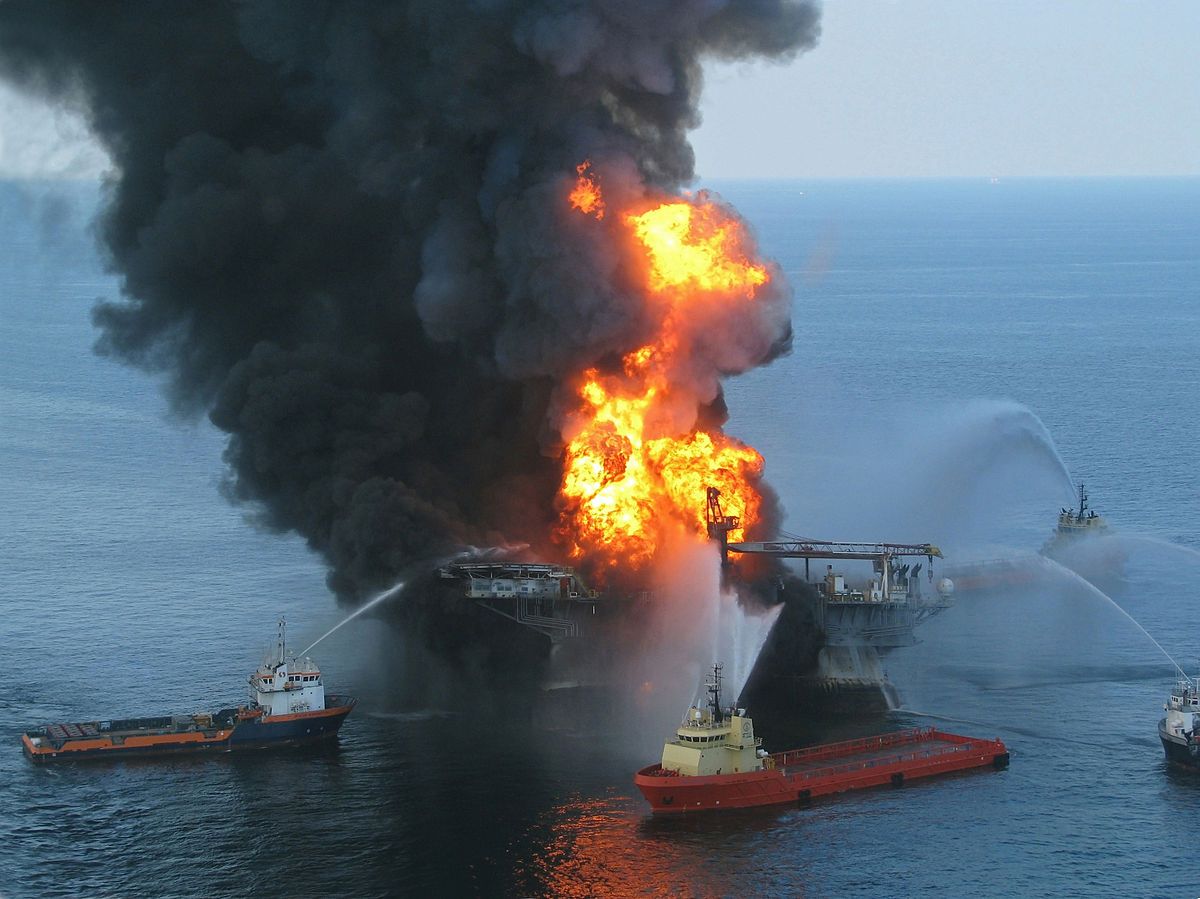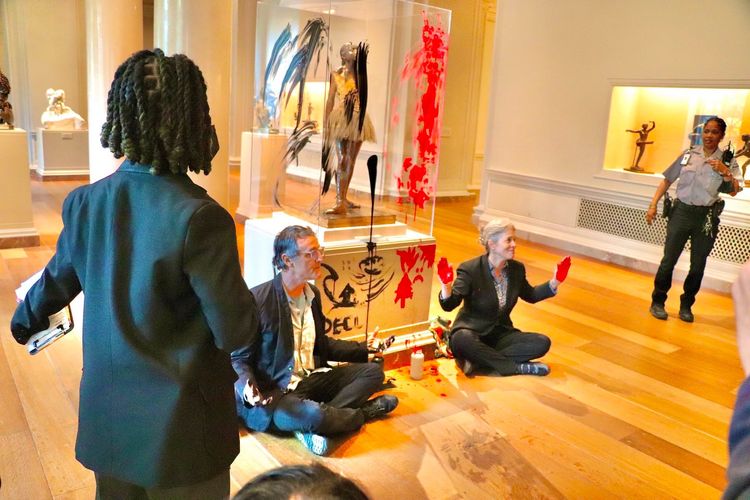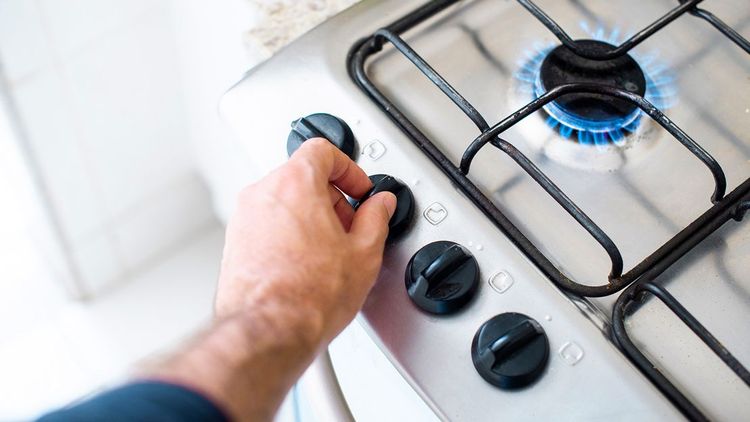April 20 Is #FUBPDay
Hey Hot Cakes!
Welcome to Hot Take! Your weekly (at least) newsletter surveying the state of the climate crisis and all the ways we’re talking—and not talking about it! We give you a round up of the latest climate stories and articles of the week, plus exclusive original reporting and commentary from us. Oh, and who are we? Amy Westervelt, long-time climate journalist with more seasoning than an everything bagel, and Mary Annaise Heglar, a literary writer known for her essays on climate, race, and emotion—and her enthusiasm for dad jokes!
In addition to this newsletter, we have a podcast and a store!
It’s time to talk about climate!

April 20 Is #FUBPDay
By Mary Annaïse Heglar
On April 20, 2010, an offshore oil platform named Deepwater Horizon exploded off the coast of Louisiana, leading to the biggest oil spill in U.S. history. The explosion killed 11 crew members immediately and went on to leak the equivalent of 300 Olympic-sized pools of oil into the Gulf of Mexico. That's 12 times more than the Exxon Valdez spill in the 1980s. BP, which bore the ultimate responsibility for the blowout and the aftermath, was so lost for solutions that it even tried throwing trash at the gushing oil.
I’m old enough to remember the blackened pelicans and dead dolphins, the devastated fisheries and fishermen and the deformed shrimp. I remember the ocean waves so rife with oil they looked less like waves of water and more like salad dressing. I remember that the spill happened just five years after Katrina when the Gulf region was just getting back on its feet. And the Gulf is still suffering today, both in the U.S. and in Mexico.
And I will never, ever, ever forgive BP.
Look, here at Hot Take, it’s fuck BP every day, all day. But that goes double on April 20. It goes triple on this April 20—the 11th anniversary of the Deepwater Horizon disaster—because we missed the 10th anniversary. To make up for lost time, we want to see y’all all up in BP’s ass, on any social media platform you’re on. I mean LinkedIn, Instagram, Facebook, and, of course, Twitter. Don’t stop at the main accounts, find the back-up accounts, like this one, or this one, or this one. Get. In. That. Ass.
I don’t care if they posted recently or 6 months ago, get in their mentions. Call them out. Expose them. Let them know we haven’t forgotten, and never will. Trust me, it feels fantastic, and they deserve it. If you need some gifs, we made some! If you get creative, please share, we live for these.
P.S. At 8:00 p.m. ET/5:00 p.m. PT on April 20, Amy and I will be hosting a Clubhouse event to talk about the best trolls of the day and more about why BP is the literal worst. Join us!
P.P.S. For more, listen to our latest episode where I made Amy watch the 2016 Deepwater Horizon movie, and we bitch about the Netflix documentary Seaspiracy.
BP: King of the Greenwashers
By Amy Westervelt
If there's one thing BP is really fucking good at, other than fucking up the planet, it's greenwashing. And lately it seems to be working better than ever. The media and the public seem to have developed a soft spot for BP, applauding the company for its plans to reduce oil production and increase its investments in renewables. Forgive me if I hold my applause, I remember the first act of this play, back in 2001. It was called Beyond Petroleum. Here are just a few reasons I will always view this company with skepticism:
- The Prudhoe Bay oil spill People forget about this one because it was so catastrophically dwarfed by Deepwater, but in 2006, a BP pipeline in Alaska leaked 267,000 gallons of thick crude oil. It was the largest spill in Alaska's North Slope oil region, and it went undetected for five days. BP later admitted to negligence, not only because it knew the pipeline in question was corroded and didn't fix it, but also because none of its staff noticed the leak for multiple days.
- Deepwater Horizon The negligence, corner-cutting, and self-regulation that caused the spill; the use of a toxic chemical dispersant to "clean it up"; the misleading ads about "making this right" and restoring the coast to normal (still hasn't happened); the shitty CEO complaining about the impacts of the spill on his life. It's hard to know where to begin with this one, but it was the worst oil disaster in U.S. history and if BP wants to position itself as an environmental leader now, it could start with finally cleaning up its mess there. Because it still hasn't made it right.
- "Renewable Natural Gas" One of these days I'll get around to fully debunking this stuff, but in broad strokes, it's natural gas made from captured methane emissions. The use-case industry likes to point to is landfills, but the way it works 90 percent of the time is they set up shop next to an industrial animal lot or dairy and capture emissions there. BP's going the industrial dairy route and calling it part of its "net zero" strategy. How industrial animal operations get you to net zero is some real oil exec clown math.
- Beyond Petroleum In 1997, British Petroleum was actually the first oil company to publicly acknowledge a link between its products and climate change. It also left the Global Climate Coalition, an industry-funded group hellbent on stopping climate policy, that year. Then it acquired Amerian oil company Amoco, and began a rebrand to show the world that it was now a bigger but greener oil company. That rebrand—Beyond Petroleum—launched in 2001. In 2006 the Prudhoe Bay spill happened, and in 2010 there was Deepwater Horizon. In the wake of Deepwater, BP sold off all of its solar and wind business and quietly ditched Beyond Petroleum for BP.
- Carbon Bullshit BP rolled out another big new thing alongside Beyond Petroleum: the carbon footprint. In much the same way that packaging and food & beverage companies had successfully convinced the American public back in the 1970s that waste was really a littering problem, up to individuals to contain, the carbon footprint put the onus on individual consumers to reduce their own CO2 emissions. Because oil companies after all, are only innocently supplying a demand. Fast forward 20 years and today the company is rolling out more carbon bullshit, leaning hard into meaningless "net zero" targets and pushing the phrase "low-carbon" to describe its energy approach.
Chernobyl Missed The Point
By Mary Annaïse Heglar
Back in 2019, I was obsessed with HBO’s limited series, Chernobyl. For those too young to remember, it chronicles one of the worst and still ongoing nuclear disasters in world history. For anyone working on climate, the story is eerily prescient as government officials ignore warnings from scientists and experts, leading to gruesome deaths for people on the frontlines and slow deaths for everyone removed, and incalculable environmental damage. Much has been made of the show as a metaphor for climate change.
But there’s just one problem with that: climate change doesn’t need a metaphor. You can just tell the damn story.
After watching Chernobyl, plenty of people were terrified of nuclear energy, myself included. But what if the producers had had that same energy for, I dunno, the Deepwater Horizon oil spill?? Which also burned people alive and traumatized an entire region and devastated ecosystems. And whose damage remains incalculable because it’s still not done. Would people be as afraid of oil and gas, which is barely regulated, as they are of nuclear, which is heavily regulated?
It’s time to tell the truth about oil and gas, and quit pussyfooting around it. This shit is toxic. It’s deadly. We don’t need to find metaphors when the truth is staring us in the face.
As the Deepwater Horizon Anniversary Rolls Around, It's Business as Usual at BP
By Amy Westervelt
BP does an extremely good job of spinning both regulations and basic business decisions as climate strategy. Congress is bringing back checks on methane emissions that Trump rolled back? BP climate policy. Laying off oil workers as demand for oil craters? BP climate policy. Selling off its petrochemicals business as that industry approaches a downturn? BP climate policy. Expanding natural gas operations and (worse), "renewable natural gas" (made with methane emissions captured from industrial dairy or meat production)? That's part of the low-carbon path to net zero, baby!
Meanwhile, despite some investments in solar, wind, and of course carbon capture and hydrogen, BP is very much doing business as usual. Here's my favorite clip of CEO Bernard Looney, Mr. Net Zero himself, at a recent employee meeting:
Need more proof that this zebra has not changed its stripes? This month, just in time to overlap with not only the anniversary of the Deepwater Horizon disaster, but also with Earth Day, BP announced the arrival of its first new oil platform to the Gulf since 2008. That's the first new platform since it dumped over 200 million gallons of oil into the Gulf, oil that is still poisoning marine life and ecosystems to this day.
The last new drilling project the company brought to the region was called Thunder Horse. This new platform, Argos, will be the centerpiece of BP's latest deepwater Gulf drilling project: Mad Dog. Petromasculinity much?
The GreenTroll
By Mary Annaïse Heglar
2 ounces gin
½ ounce elderflower liqueur
1 teaspoon absinthe (optional)
Juice of one lime
7-10 slices cucumber
1-3 leaves of basil, ripped
Ginger beer (to taste)
Mix all ingredients in a shaker, pour over ice, and top with ginger beer. You earned it.
Digest
Rising Temperatures, Rising Tides
Humans Have Destroyed 97% Of Earth’s Ecosystems, by Dharna Noor for Earther
Americans Are Already Deciding Where to Move Based on Climate Change, by Brian Kahn for Earther
An Alaskan Glacier Has Started Moving Really, Really Fast, by Molly Taft for Earther
What the megadrought in the West means for wildfire season, by Lili Pike for Vox
What a 1,600-year-old New Zealand tree can tell us about climate change, by Kate Evans for Vox
Rise of atmospheric carbon dioxide continues unabated | Greenhouse gas emissions by Paul Brown for the Guardian
Just 3% of world’s ecosystems remain intact, study suggests by Damian Carrington for the Guardian
The Climate Presidency
Bernie Sanders and Ilhan Omar Introduce Bill to Stop Fossil Fuel Subsidies, by Dharna Noor for Earther
Biden Is Following in Trump’s Footsteps When It Comes to Climate Lawsuits, by Molly Taft for Earther
Corporations That Donate to Mitch McConnell Don’t Care About Climate Change, by Kate Aronoff for The New Republic
Why Hasn’t Biden Canceled the Dakota Access Pipeline Yet? By Nick Martin for The New Republic
In the climate change fight, the Interior Department becomes a battlefield, by Juliet Eilperin and Joshua Parlow
Biden picks energy lawyer Tommy Beaudreau as Interior Department’s No. 2 official, by Dino Grandoni, Juliet Eilperin and Joshua Partlow for The Washington Post
Seeking Cooperation on Climate, U.S. Faces Friction With China, by Steven Lee Myers and Chris Buckley for The New York Times
The hottest number in conservation is rooted more in politics than science, by Benji Jones for Vox
Climate Accountability
The U.S. Has a Very Big Abandoned Oil Well Problem, by Nick Martin for The New Republic
A poultry plant, years of groundwater contamination and, finally, a court settlement, by Darryl Fears for The Washington Post
Executives Call for Deep Emission Cuts to Combat Climate Change, by Lisa Friedman for The New York Times
It’s not just Big Oil. Big Meat also spends millions to crush good climate policy, by Sigal Samuel for Vox
The Delaware River Basin paradox: Why fracking is so hard to quit, by Zoya Teirstein for Grist
Facebook says it has reached net zero emissions by Alex Hern for the Guardian
Cop26 preparations to intensify after compromise on virtual talks by Fiona Harvey for the Guardian
Shell calls on investors to vote for its new climate strategy by Jillian Ambrose for the Guardian
China ‘must shut 600 coal-fired plants’ to hit climate target by Fiona Harvey for The Guardian
Climate crisis: Boris Johnson ‘too cosy’ with vested interests to take serious action by Fiona Harvey for the Guardian
Glimmers of Hope
The U.S. Is Closer to a Zero-Carbon Grid Than It Seems, by Dharna Noor for Earther
France Climate Bill Bans Short Domestic Flights, But It’s More Than a Stunt, by Aaron Gordon for Vice
Rising from the ashes, Alaska’s forests come back stronger, by Nathanal Johnson for Grist
‘I’m hopeful’: Jerome Foster, the 18-year-old helping to craft US climate policy by Oliver Millman for the Guardian
France to ban some domestic flights where train available by Kim Willsher for the Guardian
Justice Is Justice Is Justice
The Problem With Trusting “the Science,” by John Patrick Leary for The New Republic
Let Other Countries Copy the Covid Vaccines, by Kate Aronoff for The New Republic
How Wall Street funds environmental injustice against women, by Alexandria Herr for Grist
A world of equal weight: How an Aboriginal family’s battle with fossil fuels started with a walk, by Daniel Sherrell for Grist
Native communities confront painful choice: move away, or succumb to rising waters? by Richard Arlin Walker for the Guardian
Climate in Culture
NFTs Are Shaking Up the Art World. They May Be Warming the Planet, Too, by Hiroko Tabuchi for The New York Times
Therapists Are Reckoning With Eco-Anxiety, by Isobel Whitcomb for Earther
South Korean battery makers reach last-minute settlement, by Steven Mufson for The Washington Post
Learning a New Language Can Help Us Escape Climate Catastrophe, by Nylah Burton for Vice
These People Are Losing Their Gods to Climate Change, by Thomas Lewton for Vice
Google Earth’s timelapse feature puts a spotlight on climate change, by Reuters Staff for Reuters
Goodbye, old freeways? How subtraction could address climate change, by Kate Yoder for Grist
Plus More
Researchers Created the Whitest White Paint Ever, by Molly Taft for Earther
Burning Pig Poop Fumes Doesn’t Solve Anything, by Nick Martin for The New Republic
Climate scientists swap fieldwork for finance, by Simon Jessop, Carolyn Cohn, and Iain Withers for Reuters
‘This is it. If we don’t amp up, we’re goners’: the last chance to confront the climate crisis? by Jeff Goodell for the Guardian





Only paid subscribers can comment.
Please subscribe or sign in to join the conversation.